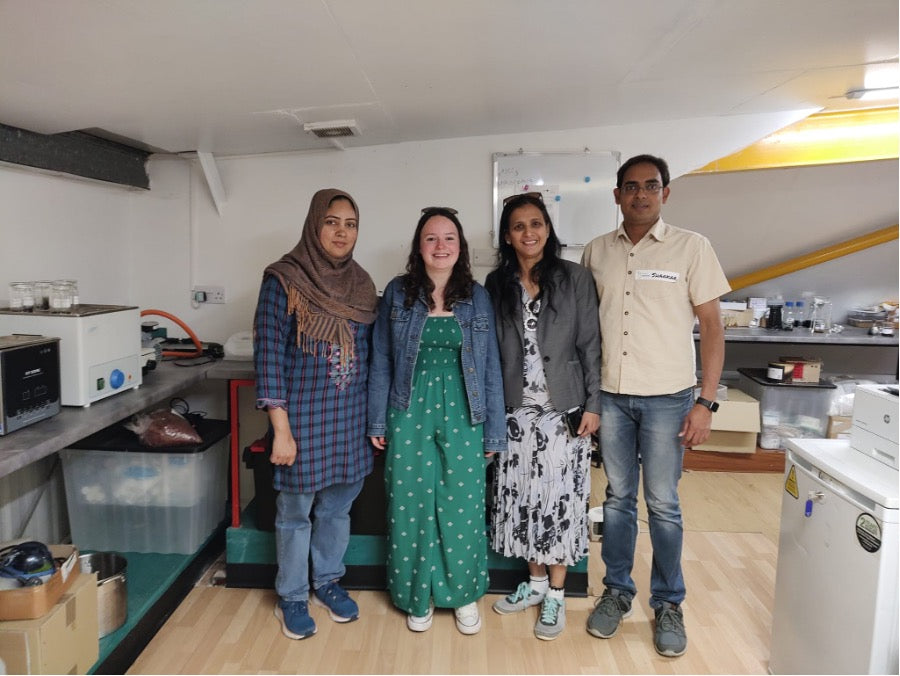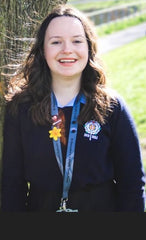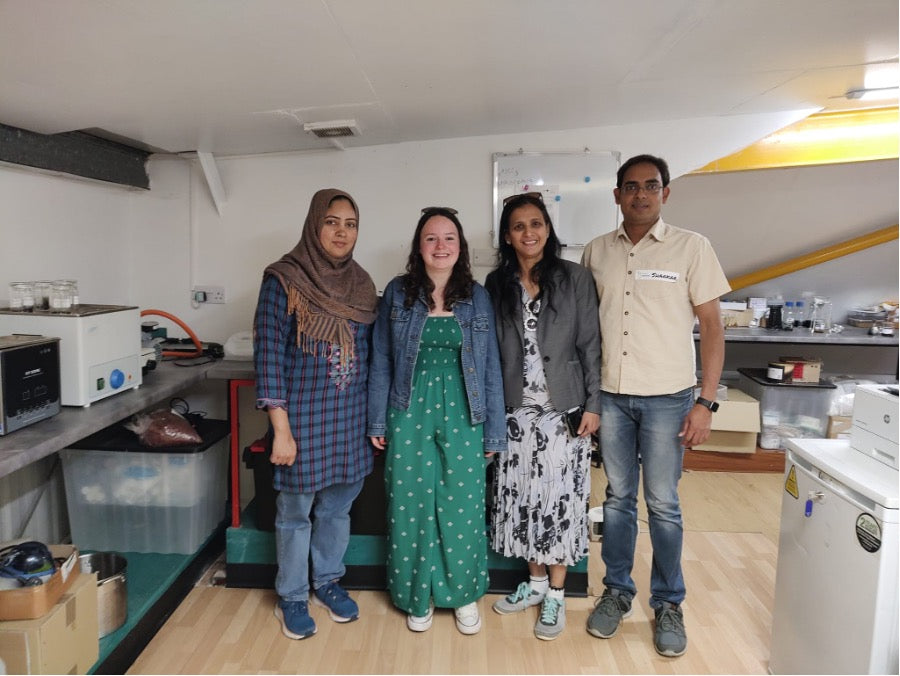
Celebrating International Women's Day - INSPIRING INCLUSION
The theme of this International Women’s Day is INSPIRING INCLUSION. On an individual basis, it's important to understand, value and seek out the inclusion of women and girls. Additionally, sharing this knowledge, support and encouragement with others is key. Please click here for more information.
At Nature’s Laboratory we were delighted to host Ellie Castleden, last summer, for a week’s work experience in our research and quality control laboratory. Ellie is an 18 years-old school student from Bradford, and found out about us through visiting The Dispensary health shop, whilst visiting Whitby. Nature’s Laboratory supports The Dispensary as part of our vision of the importance of community along with the social and cultural aspects of our lives.
We were even more delighted to learn recently that Ellie had, this year, been given a conditional offer for the University of Oxford, to study a Biomedical Science Integrated Master’s Degree.
According to UNESCO, although Science, Technology, Engineering and Mathematics (STEM) fields are widely regarded as critical to national economies, so far, most countries, no matter their level of development, have not achieved gender equality in STEM. So, we felt, what better way to celebrate International Women’s Day, than to share our recent interview with Ellie and shine a light on the inclusion of women and girls in science.

We spoke with Ellie about her love for science, her inspirations and her hopes for the future.
Do you remember at what point you became interested in science and research? And was there something that sparked your interest?
The point where I realised that I wanted to do science as a career came at the start of my science GCSEs, we were studying infection and response in the body & I remember going away and reading anything I could on the subject. One of my science teachers at the time worked in a lab before becoming a teacher, so she shared a bit of her experience of that while we were learning. And I thought, that sounds like something I’d like to do for the rest of my life! It’s invaluable to have inspirational teachers. Looking back, I think there’s always been little bits of science that have caught my attention, like learning about the heart, and when I was going into key stage 2, I had a magazine where I built the body up and looked at its systems. It’s always been an undercurrent of interest that has gone through my whole life.
What are you studying at the moment, and what exam results did you need to get into Oxford?
I’m studying for my A levels at the moment- Chemistry, Biology & English Literature. I like having a combination of art and science and seeing some similarities. The degree I want to study for, Biomedical Sciences, it’s all to do with people, you’re not just dealing with an isolated test tube of a sample, it’s from a person and it’s nice to remember that it’s people that you’re working for, for a greater goal. I’ve got a conditional offer from the University of Oxford at the moment, so I need an A star in Biology, & an A in my other two A levels.
Could you explain a bit about the course you’ve applied for at the University of Oxford and why you applied for this course?
I picked Biomedical Sciences in general for all of my university options, because that was the area of science that caught my interest the most; what’s happening in the body when it’s working and what’s happening when it’s going wrong and how can we fix that. What I loved about Oxford was that it’s an integrated Masters, so it includes a year of research. Spending time in the research laboratory at Nature’s Laboratory in Whitby was the bit that really caught my attention; having something to work for, and questioning and changing your approach, and that’s why I chose to apply to the University of Oxford, because it gave me the option straight away do more of that research experience. If I get accepted onto the course, I’ll be starting this October.
If you are accepted onto the course, what are you most looking forward to about studying at Oxford?
I’m really looking forward to the research experience and being able to broaden my horizons. At A level at the moment, you start noticing things you have questions about, but due to studying for exams there’s not always the time to follow things into detail. At Oxford they’re very good at the small group teaching, that you can lead with what you’re interested in. I can talk to those world-leading academics and get all the information that I can, that’s what I’m really looking forward to, as well as some of the university activities, such as formal dinners and balls. I’m the first in my immediate family to go to university, that’s something that I think is really exciting that I haven’t seen before!
Could you tell us a bit about your work experience at Nature’s Laboratory? Any highlights and has it helped you onto the next stage?

Left to right: Samra Ihsan, Ellie Castleden, Dr Bhagyashree Kamble, Dr Shankar Katekhaye.
When I emailed Nature’s Laboratory about work experience, I just wanted to see what kinds of careers there might be in science, and when I was put in the lab, I was really surprised at how hands on I was so quickly, which made it much more interesting. I spent a week last August in my summer holidays there. I remember helping with the formulation of propolis shampoo, and looking at how to make tinctures, and I remember one day they were sampling and looking at how you can quality control and test what you’ve got. Before spending time at Nature’s Laboratory, I hadn’t really known much about herbal medicine, so it was lovely while I was there being able to ask questions, and everyone was so kind and indulged my curiosity with such enthusiasm themselves. I remember there was one time when I was using a microscope and we were analysing a sample of herbs, and checking and matching up, and I thought, I could see myself doing something like this for the rest of my life and being very happy about it. I was in the lab with Dr. Shankar, Dr. Bhagyashree and Samra, and it was lovely being able to speak to them. I think that was what gave me the push to think I could do research, especially seeing Dr. Bhagyashree and Samra, such influential female role models in science that I hadn’t really been around before. It helped me to see myself in the industry a little bit more and think I could really go for this.
Do you have any female role models or heroines? And if so, who are they and why?
I’ve had brilliant science teachers at school. I’ve been fascinated looking at the work of women in science in history such as Dorothy Hodgkin on the structure of biological molecules, like penicillin and insulin and Rosalind Franklin and the structure of DNA. And also looking at scientists in modern day like Dr Bhagyashree and Samra, who are at the cutting edge of research which has the potential to make incredible differences to people’s lives.
What advice would you give to girls and young women, wishing to work in science?
Have the courage and go for it! It might seem a little bit daunting because science is such a continually evolving and broad spectrum of a subject, but I think as long as you’ve got the passion and the interest for it, just have the courage and go for it, because it could be so rewarding and one of the best things that you’ve ever done.
Do you know what you would like to do when you graduate?
I’d love to spend some time in research. I’d love to spend a portion of my working life being in a research lab, looking at researching and answering those questions that I’ve always had. I’ve also always loved the idea of teaching. I’ve been lucky enough to tutor some younger students at GCSE at the moment and I’m finding that really rewarding as well, so that might be something I look into after I’ve spent some time in research. I’d hope to be like the amazing role models I’ve had and inspire the next generation beyond that.
As a young person looking forward, what do you see as our challenges, and what do you wish for the world?
Looking forward I think there’s a lot more progress we can make. I recall Samra’s research (at Nature’s Laboratory) looking into the new problems in science like the antibiotic resistance in bacteria, and following the Covid 19 pandemic, ways to improve on our response to that. In general, for the world, I think more acceptance of science and more progress, more awareness of what goes on, but ultimately to use science for the good of other people, so that it can improve not just people’s health, but their lives and the world in general.
Is there anything else you’d like to share with us?
Mainly just a huge thank you to Nature’s Laboratory, it was the experience I had there, where I realised that I wanted to do this for the rest of my life and it gave me the encouragement to take that step and apply to Oxford. Without doing my work experience at Nature’s Laboratory I don’t think I would have had the opportunity or the courage to go for it- so I’m just so thankful that you were so accommodating and let me do my work experience there.
Dr. Bhagyashree Kamble, one of the scientists that Ellie worked with at Nature’s Laboratory said this about Ellie:
“In today’s time when most of the world wants everything instantly, Ellie is an exceptional student, who was patient and keen on learning new aspects of science whilst being here at Nature’s Laboratory.
Ellie is a student who is very sincere, positive, and ready to learn. I’m sure she will give her best in everything she will do. Ellie is keen on science and was happy to learn everything that we were sharing with her. She is a positively passionate and happy science student, which is rare in today’s instant fame time. I wish her all the best in her future.”
All of us at Nature’s Laboratory wish Ellie well in her future studies, work and life and hope that she will return to visit us from time to time. We are sure that she will be the amazing role model that she aspires to be and will inspire future generations of girls and women to become what they dream of.
HAPPY INTERNATIONAL WOMEN’S DAY TO YOU ALL!
